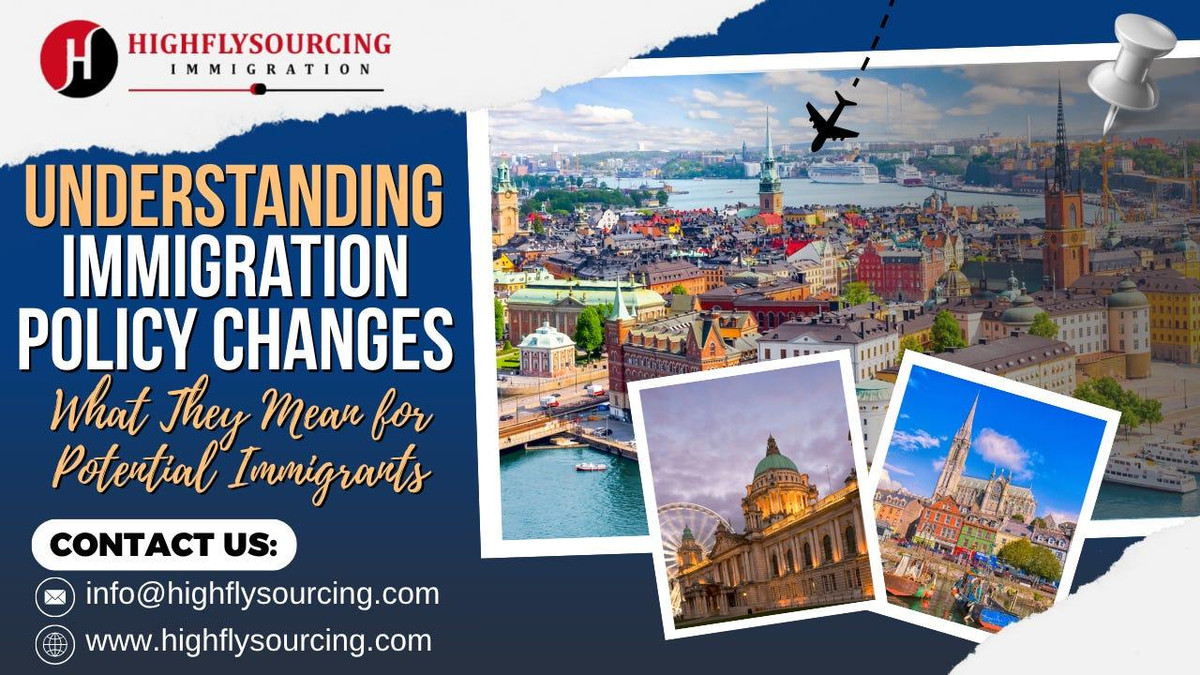In recent years, immigration policies across the world have seen significant changes. Countries like Canada, Australia, the United Kingdom, and the United States have implemented new rules, revised visa criteria, and introduced stricter compliance mechanisms to adapt to global challenges — ranging from labor shortages to economic shifts and post-pandemic recovery efforts.
For potential immigrants, these changes can be both an opportunity and a challenge. Understanding the new regulations, aligning personal goals with revised criteria, and navigating more complex processes is critical. This is where immigration consultancy services become more valuable than ever before.
In this blog, we’ll explore:
- The key immigration policy changes across major countries,
- Their implications for potential immigrants,
- And how consultancies help navigate these transitions effectively.
📌 Key Immigration Policy Changes in 2024–2025
Let’s begin by understanding what’s new in immigration across popular destinations.
🇨🇦 Canada: Stricter Caps & Occupation Targeting
- Express Entry draws now favor specific occupations (e.g., healthcare, STEM, trades).
- Increased language score thresholds for many programs.
- Temporary visa holders now face stricter work-to-PR transition rules.
- More focus on Francophone immigrants and regional migration (outside major cities).
🔍 Implication: General applicants with average CRS scores or non-targeted occupations now face lower chances of ITA (Invitation to Apply). Francophone skills or employer support in rural regions could be game changers.
🇦🇺 Australia: Overhaul of Points System & Focus on Critical Skills
- Major reform announced in General Skilled Migration (GSM) points system.
- New focus on critical skill sectors: IT, Engineering, Healthcare.
- Increased English language requirements and reduced visa validity in some streams.
- Emphasis on permanent migration pathways for international students and skilled workers.
🔍 Implication: Applicants must now strategically choose study or work sectors that align with the skilled occupation list. Simply meeting points may no longer be enough.
🇬🇧 United Kingdom: Rising Salary Thresholds & Immigration Control
- Salary threshold for Skilled Worker visas raised significantly.
- New minimum income requirements for family visa sponsors.
- Restrictions on dependents for international students (except postgrad research).
- Higher Immigration Health Surcharge (IHS) introduced.
🔍 Implication: Budget planning and careful selection of job offers become crucial. Entry for families is now more difficult unless income conditions are met.
🇺🇸 United States: Priority to Employment-Based Green Cards
- Increase in employment-based visa caps, particularly EB-3 and EB-2.
- Tighter scrutiny on H-1B applications, especially from IT services firms.
- Simplified pathways for STEM graduates under OPT and green card processes for advanced degree holders.
- Discussions on merit-based immigration model progressing in Congress.
🔍 Implication: U.S. remains competitive for high-skilled professionals, but the H-1B lottery system still limits access. STEM grads with U.S. education gain a strong edge.
💥 Implications for Potential Immigrants
With all these dynamic changes, here are the real-world challenges applicants are facing:
1. Increased Complexity in Eligibility
Immigration is no longer a simple checklist of qualifications. Governments are designing more targeted and evolving criteria, such as occupation-based draws or regional migration incentives.
Challenge: Many applicants may no longer qualify under standard routes or may waste time applying for misaligned programs.
2. Higher Financial & Language Requirements
From English tests like IELTS to income thresholds and visa surcharges, the financial burden of migration is increasing. Applicants must now plan well in advance to budget appropriately and score higher on standardized tests.
Challenge: Even qualified professionals are getting disqualified for minor technicalities.
3. Frequent Policy Updates
Immigration policies are now being updated more frequently, especially post-COVID and due to political and labor market shifts.
Challenge: Applicants who prepare using outdated information are at risk of rejection or delays.
4. Limited Transparency & Visa Quotas
Quotas, draw patterns, and approvals are increasingly dependent on internal assessments by governments. Many programs operate on invitation-only basis (e.g., Express Entry or state nomination programs), creating uncertainty.
Challenge: Strategic planning and timing are now critical for success.
💼 The Role of Immigration Consultancies in a Changing Environment
With such volatile and unpredictable landscapes, immigration consultants offer clarity and expertise that can make the difference between success and rejection. Here’s how:
✅ 1. Real-Time Policy Updates & Legal Insight
Reputable immigration consultancies stay constantly updated with global policy shifts. They interpret complex legal language into simple, actionable insights.
Benefit: Applicants don’t have to worry about missing a crucial rule change or misinterpreting eligibility.
✅ 2. Profile Analysis and Custom Strategy
A good consultancy doesn’t apply the same template to every case. They conduct a comprehensive profile assessment, suggest the most viable pathway (including alternatives), and align your background with country-specific goals.
Benefit: Maximizes the chance of selection and minimizes wasted efforts.
✅ 3. Documentation & Compliance Support
Incorrect or incomplete documentation is one of the top reasons for visa denials. Consultants ensure every form, certificate, and statement is correctly filled, verified, and submitted on time.
Benefit: Reduces legal risks and processing delays.
✅ 4. Language and Test Preparation
With rising IELTS/TOEFL score requirements, consultancies often offer in-house coaching or partnerships with training institutes to help applicants meet the standards.
Benefit: Boosts eligibility and improves CRS or points ranking.
✅ 5. Appeals and Reapplication Services
For applicants who’ve been rejected, immigration consultants can help analyze the reason for rejection, gather stronger evidence, and refile with better chances.
Benefit: Saves time and gives applicants a second shot at success.
✅ 6. End-to-End Planning: From Application to Settlement
Some consultancies offer end-to-end support, including:
- Job assistance
- Interview preparation
- Pre-departure counseling
- Travel arrangements
- Accommodation and settlement services
Benefit: Peace of mind throughout the entire journey — not just until the visa is approved.
🧭 Conclusion: Adapt, Prepare, and Succeed with Expert Help
The immigration landscape is evolving faster than ever. With countries fine-tuning their visa rules and tightening eligibility, it’s no longer enough to “just apply.” Applicants need to adapt quickly, prepare strategically, and comply rigorously to succeed.
Immigration consultancies are no longer a luxury — they’re a necessity for many. Their expertise can help potential immigrants:
- Choose the right path,
- Stay informed on policy changes,
- Improve eligibility,
- And ensure a smooth and successful relocation.
📞 Ready to Start Your Immigration Journey?
Highfly Sourcing Immigration is here to help you navigate every twist and turn of today’s immigration world. From Canada to Australia, the UK to Germany, our experts offer personalized solutions that turn your global dreams into a reality.
📧 Contact us to get a free counsultation today!
Follow Us On:-




